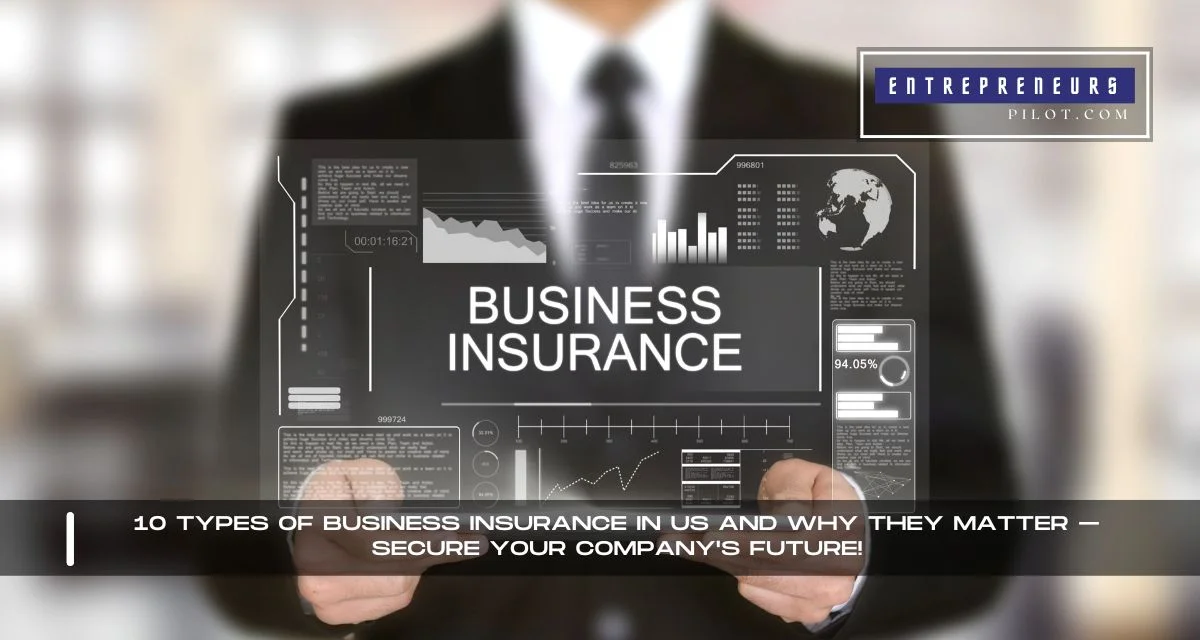Introduction
Navigating the world of business insurance can often feel like traversing a labyrinth, complex and full of unexpected turns. Yet, understanding the different Types Of Business Insurance In US is crucial for securing your company’s future. Whether you’re a budding entrepreneur or at the helm of an established enterprise, the right insurance policies act as a safety net, protecting your hard work from unforeseen events. This guide illuminates the path, detailing 10 essential types of business insurance and why they’re not just important but indispensable. Let’s embark on this journey to safeguard your business’s tomorrow, today.
Table of Contents
1. General Liability Insurance
General Liability Insurance is the cornerstone of business protection. It covers legal fees, settlements, and medical costs in cases of bodily injury, property damage, or personal and advertising injury to third parties. In today’s litigious society, this insurance is indispensable, acting as a first line of defense against common lawsuits.
- For Expert Financial Insights And Guidance, You Can Visit Our Sister Site – ArabsGeek.com Now!
- Curiosity Piqued? Dive Into the Most Captivating Financial Content by Visiting Our Homepage!
- Unlock Exclusive Business Opportunities! 🚀 Connect with Us Now at our Email: [email protected]!
2. Professional Liability Insurance
Also known as Errors and Omissions (E&O) Insurance, Professional Liability Insurance is crucial for businesses that provide services or advice. It protects against claims of negligence, misrepresentation, or failure to deliver a service as promised. In a world where expectations are high and mistakes are costly, this insurance offers peace of mind.
3. Property Insurance
Whether you own or lease your business space, Property Insurance is a must. It covers equipment, inventory, furniture, and other assets from fire, theft, and natural disasters. Customizable to your specific needs, it ensures that your business can rebound quickly after a loss.
4. Workers’ Compensation Insurance
Workers’ Compensation Insurance provides benefits to employees who get injured or sick from their job. It covers medical care, disability benefits, and a portion of lost wages. In most states, having this insurance is a legal requirement once you have employees, making it not just necessary but obligatory.
5. Product Liability Insurance
For businesses that manufacture, distribute, or sell products, Product Liability Insurance is essential. It protects against lawsuits related to product defects that cause injury or harm. Given the potential severity of such claims, this insurance can be the difference between a minor setback and a major financial disaster.
6. Business Interruption Insurance
Business Interruption Insurance, or Business Income Insurance, covers loss of income resulting from a disaster that disrupts the operation of your business. It helps pay for expenses like rent and payroll, allowing your business to maintain financial stability during repairs or rebuilding periods.
7. Cyber Liability Insurance
In an era where digital threats loom large, Cyber Liability Insurance is increasingly critical. It covers your business against data breaches, cyber-attacks, and other tech-related risks. With the average cost of a data breach soaring, this insurance can be a lifeline for any business operating online.
8. Commercial Auto Insurance
If your business uses vehicles, Commercial Auto Insurance is non-negotiable. It covers property damage and liability claims from accidents involving your business vehicles. Whether you have a fleet of trucks or a single company car, this insurance ensures your business stays on the move.
9. Directors and Officers Insurance
Directors and Officers (D&O) Insurance protects the personal assets of your company’s leaders from lawsuits related to their management decisions. In today’s high-stakes business environment, this insurance provides confidence and security, encouraging top talent to lead boldly.
10. Employment Practices Liability Insurance
Employment Practices Liability Insurance (EPLI) covers wrongful acts arising from the employment process, including claims of discrimination, wrongful termination, and harassment. In a climate where employment lawsuits are on the rise, EPLI is more important than ever.
Conclusion
In the complex tapestry of running a business, insurance is the thread that holds it all together in times of crisis. The Types Of Business Insurance In US outlined above are not just policies; they are pillars on which the security and future of your company rest. By investing in the right insurance, you’re not just protecting your business; you’re ensuring its growth and longevity. Remember, in the unpredictable journey of entrepreneurship, it’s not just about surviving the storms but thriving beyond them.
Frequently Asked Questions
01. What is the most important type of business insurance?
The “most important” type of business insurance varies based on your business activities, industry, and specific risks. However, General Liability Insurance is often considered fundamental for most businesses due to its broad coverage.
02. How do I choose the right insurance for my business?
Assess your business’s specific risks and consult with an insurance agent or broker who specializes in business insurance. They can help tailor a package that fits your unique needs.
03. Can a small home-based business benefit from business insurance?
Absolutely. Even small, home-based businesses face risks that can be mitigated with the right insurance policies, such as General Liability or Professional Liability Insurance.
04. Is business insurance tax-deductible?
Yes, business insurance premiums are generally tax-deductible as a business expense. It’s advisable to consult with a tax professional for specific advice related to your business.
05. How often should I review my business insurance policies?
It’s wise to review your business insurance policies annually or whenever there are significant changes to your business operations, structure, or assets to ensure adequate coverage.











